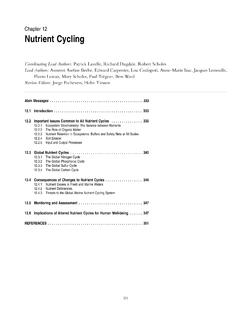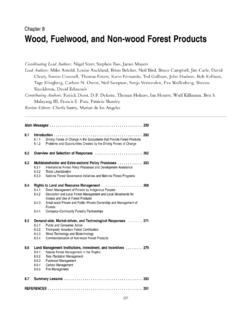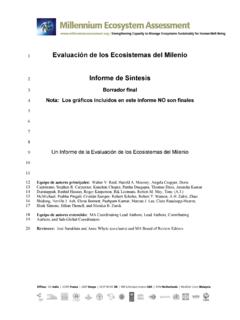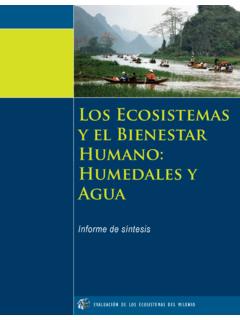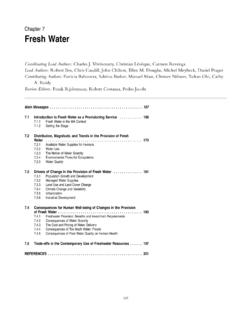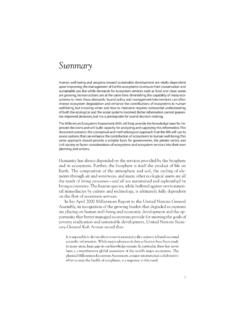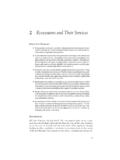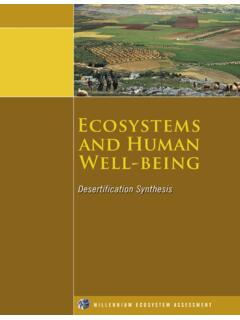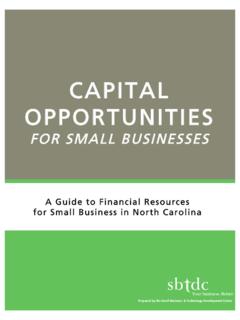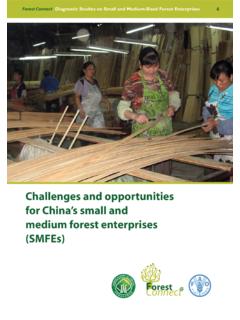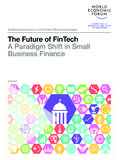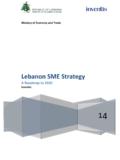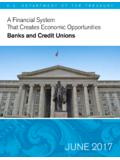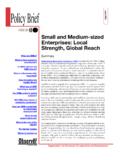Transcription of Ecosystems AND HUMAN WELL-BEING
1 Ecosystems and HUMAN WELL-BEING : O p p o r t u n i t i e s a n d C h a l l e n g e s f o r B u s i n e s s a n d I n d u s t r y 1 MILLENNIUM ECOSYSTEM ASSESSMENTO pportunities and Challenges for Business and IndustryEcosystemsAND HUMAN well -BEINGMILLENNIUM ECOSYSTEM ASSESSMENTE cosystems and HUMAN WELL-BEING : O p p o r t u n i t i e s a n d C h a l l e n g e s f o r B u s i n e s s a n d I n d u s t r y2 Millennium Ecosystem Assessment Business and Industry Synthesis TeamSynthesis Team MembersSynthesis Team Co-chairsSteve Percy CEO, BP America (formerly)Jane Lubchenco Distinguished Professor of Zoology, Oregon State UniversityFernando Almeida Business Council for Sustainable Development-BrazilPaul Armsworth University of SheffieldAndrew Bennett Syngenta Foundation for Sustainable AgricultureKristie Ebi Exponent Health GroupJohn Ehrmann Meridian InstituteJames Griffith World Business Council for Sustainable DevelopmentPushpam Kumar Institute of Economic GrowthStefano Pagiola The World BankGlen Prickett Conservation InternationalDavid Richards Rio TintoJorge Rivera George Washington UniversityValerie Thompson World Resources InstituteAxel Wenblad Skanska ABGary Yohe Wesleyan UniversityA Report of the Millennium Ecosystem AssessmentThe Millennium Ecosystem Assessment (MA) is a four-year international scientific assessment of the consequences of ecosystem change for HUMAN WELL-BEING .
2 A multisectoral Board of Directors consisting of senior representatives from government, business, NGOs, agencies, academia, and indigenous peoples developed and managed the MA. The assessment was conducted by 1,360 natural and social scientists from 95 countries and was comprehensively peer-reviewed by an additional 600 experts. It provides a state-of-the-art scientific appraisal of the condition and trends in the world s Ecosystems and the services they provide (such as clean water, food, forest products, flood control, and natural resources). The assessment also analyzed options to restore, conserve, or enhance the sustainable use of Ecosystems and their contributions to HUMAN WELL-BEING . Financial support for the MA was provided by a variety of governments, institutions, and foundations around the world. This report synthesizes the take-home messages of the MA for the business community throughout the industrial and developing world.
3 It begins by highlighting key MA findings with particular relevance for businesses large and small. The report then provides an interpretation of the significance of these findings for business and industry, including a checklist of questions designed to help tailor the general findings of the MA to a particular business. This report was prepared by a panel of assessment authors and representatives of businesses and partner organizations, academic experts, and members of the NGO community. It provides a portal for businesses into the Millennium Ecosystem the Millennium Ecosystem Assessment Is Important for Business and Industry 2 The Bottom Line 3 What We Know 6 Key Trends in Ecosystems and Their Services 6 Ecosystem Trends of Particular Importance to Business 10 Scenarios in the Assessment 19 Changing Policy Environment 22 How the MA Findings Affect Your Bottom Line 24 License to Operate 24 Corporate Image, Reputation, and Brand Risk 24 Cost of Capital and Perceived Investor Risk 25 Access to Raw Materials 25 Operational Impacts and Efficiencies 26 New Business opportunities 27 New Technologies for New opportunities 28 Taking the Next Steps 29 Appendix: MA Web Site 31 ContentsEcosystems and HUMAN WELL-BEING : O p p o r t u n i t i e s a n d C h a l l e n g e s f o r B u s i n e s s a n d I n d u s t r y2 businesses interact with Ecosystems and ecosystem services in two important ways.
4 They use services and they contribute to ecosystem change. The MA discovered that two thirds of the ecosystem services it examined are being degraded or used unsus-tainably. This finding has serious ramifications for the world at large and will affect business and industry in three principal ways. 1. If current trends continue, ecosystem services that are freely available today will cease to be available or become more costly in the near future. Once internalized by pri-mary industries, additional costs that result will be passed downstream to secondary and tertiary industries and will transform the operating environment of all businesses . 2. Loss of ecosystem services will also affect the framework conditions within which businesses operate, influencing customer preferences, stockholder expectations, regulatory regimes, governmental policies, employee WELL-BEING , and the availability of finance and insurance. Business cannot function if Ecosystems and the services they deliver like water, biodi-versity, fiber, food, and climate are degraded or out of balance.
5 World Business Council for Sustainable Development 3. New business opportunities will emerge as demand grows for more efficient or different ways to use ecosystem ser-vices for mitigating impacts or to track or trade cannot assume that there will be ample warning of a change in the availability of key services or that a company s past responses to changes will be successful in the future. Ecosystems often change in abrupt, unpredictable ways. Most Ecosystems are being altered by HUMAN actions in unprecedented ways. Conse-quently, it is difficult to predict the future state of an ecosystem or the availability of an ecosystem service. In addition, these uncertainties mean that past successes in ecosystem management may not apply to current or future conditions. The solutions of the past are often not robust enough under the conditions of global change and need to be re-thought and re-implemented. Antony Burgmans, Chairman, Unilever The MA provides a benchmark for public policy, public awareness, and the private sector; it will influence investments, the regulatory climate, and public opinion at national and inter-national levels over the next 10 years.
6 Using the findings of the MA can help ensure that a company s ventures are informed by the best available scientific information. Factoring that informa-tion into plans will allow businesses to position themselves as innovators and market leaders. Failure to keep pace with these changes risks the loss of competitive advantage, brand reputa-tion, and the license to operate, innovate, and though Earth s natural capital is being eroded at a rapid rate, there is still time to lessen the impact and preserve options by building on a growing number of examples of good practice. The MA is designed to help decision-makers factor information about changes in Ecosystems into their strategic planning. It provides a framework for the integrated management of multi-ple, interacting ecosystem services. The MA is the most com-prehensive analysis to date of the many and complex ways in which people depend on and affect the natural environment. businesses engagement in voluntary actions to reduce their impact on Earth s Ecosystems can be an engine of positive change in two ways: it can be a source of new opportunities for business, and a means of preserving our natural assets for future generations.
7 Jonathan Lash, President World Resources Institute 1. Why the Millennium Ecosystem Assessment Is Important for Business and IndustryEcosystems and HUMAN WELL-BEING : O p p o r t u n i t i e s a n d C h a l l e n g e s f o r B u s i n e s s a n d I n d u s t r y 3 People everywhere rely on Ecosystems and the services they provide. So do businesses . Demand for these services is increasing. However, many of the world s Ecosystems are in seri-ous decline, and the continuing supply of critical ecosystem ser-vices is now in jeopardy. The loss or degradation of ecosystem services will have impacts on HUMAN WELL-BEING . It will also profoundly affect businesses . Higher operating costs or reduced operating flexibil-ity should be expected due to diminished or degraded resources (such as fresh water) or increased regulation. Every threat creates opportunity. Innovation and technology to minimize the damage to Ecosystems and to mitigate impacts already occurring are creating significant new business opportu-nities for those who are aware and impacts of ecosystem degradation will be felt over both the short term the next 5 years and the longer term the 2.
8 The Bottom LineWhat are Ecosystems and Ecosystem Services?An ecosystem is a dynamic complex of plants, animals, microbes, and physical environmental features that interact with one another. Ecosystem services are the benefits that humans obtain from Ecosystems , and they are produced by interactions within the eco-system. Ecosystems like forests, grasslands, mangroves, and urban areas provide different services to society. These include provisioning, regulating, and cultural services that directly affect people. They also include supporting services needed to maintain all other services. Some ecosystem services are local (provision of pollinators), others are regional (flood control or water purification), and still others are global (climate regulation). (See Figure 1.) Eco-system services affect HUMAN WELL-BEING and all its components, including basic material needs such as food and shelter, individual health, security, good social relations, and freedom of choice and action.
9 (See Figure 2.)Figure 1. Ecosystems and Some Services They Provide Different combinations of services are provided to humans from the Ecosystems represented here. Their ability to deliver the services depends on complex biological, chemical, and physical interactions, which are in turn affected by HUMAN and HUMAN WELL-BEING : O p p o r t u n i t i e s a n d C h a l l e n g e s f o r B u s i n e s s a n d I n d u s t r y4 Figure 2. Linkages between Ecosystem Services and HUMAN WELL-BEING This Figure depicts the strength of linkages between categories of ecosystem services and components of HUMAN WELL-BEING . It includes indications of the extent to which it is possible for socioeconomic factors to mediate the linkage. For example, if it is possible to purchase a substitute for a degraded ecosystem service, then there is a high potential for mediation. The strength of the linkages and the potential for mediation vary according to the specific ecosystem and region.
10 In addition, other factors including other environmental factors as well as economic, social, technological, and cultural factors influence HUMAN WELL-BEING . Ecosystems are in turn affected by changes in HUMAN WA TERWOOD AND REGULATIONFLOOD REGULATIONDISEASE REGULATIONWATER CYCLINGSOIL FORMATIONPRIMARY SAFETYSECURE RESOURCE ACCESSSECURITY FROM DISASTERSB asic materialfor good lifeADEQUATE LIVELIHOODSSUFFICIENT NUTRITIOUS FOODSHELTERACCESS TO GOODSH ealthSTRENGTHFEELING WELLACCESS TO CLEAN AIRAND WATERGood social relationsSOCIAL COHESIONMUTUAL RESPECTABILITY TO HELP OTHERSF reedomof choiceand actionOPPORTUNITY TO BEABLE TO ACHIEVEWHAT AN INDIVIDUALVALUES DOINGAND BEINGECOSYSTEM SERVICESCONSTITUENTS OF well -BEINGLIFE ON EARTH - BIODIVERSITYLowMediumHighARROW S COLORP otential for mediation bysocioeconomic factorsWeakMediumStrongARROW S WIDTHI ntensity of linkages between ecosystemservices and HUMAN well -beingSource: Millennium Ecosystem Assessmentnext 50 years.
